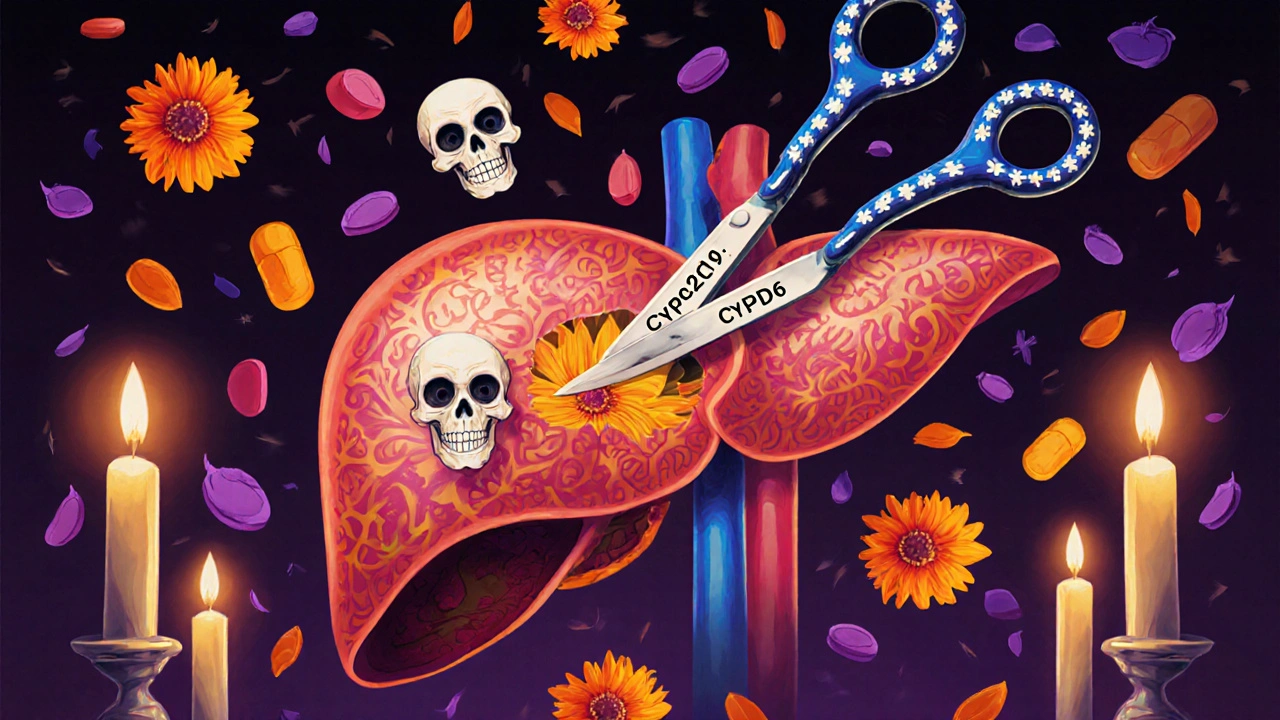
SSRI Side Effect Risk Calculator
This tool estimates how your CYP2C19 and CYP2D6 genetic variants may affect your risk of side effects with SSRIs based on clinical evidence from the article. Results are for informational purposes only and do not replace professional medical advice.
When you start an SSRI like sertraline or escitalopram, you’re not just taking a pill-you’re triggering a complex chemical reaction inside your body. For some people, it works smoothly. For others, even a low dose causes dizziness, nausea, or insomnia that never goes away. Why? One major reason might be hidden in your DNA. Two genes-CYP2C19 and CYP2D6-control how fast your body breaks down these antidepressants. And if your version of these genes is unusual, your drug levels can be too high or too low, leading to side effects-or no effect at all.
What CYP2C19 and CYP2D6 Actually Do
These genes code for enzymes in your liver that act like molecular scissors. They chop up SSRIs so your body can get rid of them. But not everyone’s scissors work the same way. Some people have versions of these genes that cut too slowly (poor metabolizers), too quickly (ultrarapid metabolizers), or just right (normal metabolizers). The result? Big differences in how much drug stays in your bloodstream.
CYP2C19 handles citalopram, escitalopram, and sertraline. CYP2D6 handles fluoxetine, paroxetine, and venlafaxine. If you’re a poor metabolizer of CYP2C19, your escitalopram levels can be over three times higher than someone with normal metabolism. That’s not just a little more drug-it’s enough to push you into side effect territory. On the flip side, if you’re an ultrarapid metabolizer of CYP2D6, your body clears venlafaxine so fast that you never reach the level needed to help your mood.
How Genetic Variants Change Your Risk of Side Effects
It’s not theoretical. Real patients are seeing this play out in their daily lives.
A 45-year-old woman in a 2023 clinical case study was prescribed 75 mg of venlafaxine-standard dose. She developed severe dizziness and insomnia within days. Her genetic test showed she was a CYP2D6 poor metabolizer. Her body couldn’t clear the drug. Her doctor cut the dose in half. Within a week, her symptoms vanished. She was able to stay on treatment.
Another patient, a CYP2C19 ultrarapid metabolizer, tried 20 mg of escitalopram for months with no improvement. His doctor increased the dose to 40 mg based on his genetic results. Within three weeks, his depression lifted. He hadn’t responded at all at the standard dose.
Studies show these aren’t rare cases. Poor metabolizers of CYP2D6 are 2.7 times more likely to report serious side effects with venlafaxine. CYP2C19 poor metabolizers report 2.8 times more side effects with citalopram. In one large survey, CYP2D6 poor metabolizers were over three times more likely to say they had “severe” side effects with paroxetine than normal metabolizers.
But here’s the catch: not everyone with a risky gene variant has bad outcomes. Some people tolerate high drug levels without issues. Others with normal genes still get side effects. That’s because genes aren’t the whole story. Age, liver health, other medications, and even diet all play a role. But when you’re stuck in a cycle of trying one drug after another, your genes can be the missing piece.
What the Evidence Really Says
You’ll hear conflicting things about this testing. Some doctors swear by it. Others say it’s overhyped. The truth lies in the details.
For tricyclic antidepressants like amitriptyline, the link between CYP2D6 and side effects is rock-solid. The Clinical Pharmacogenetics Implementation Consortium (CPIC) gives it the highest evidence rating: A. For SSRIs? It’s a B. That means the evidence is good-but not as strong.
Here’s why: while we know for sure that poor metabolizers have much higher drug levels, we’re less certain that this always leads to better outcomes. One study of over 5,800 people found no clear link between CYP2C19 genotype and whether escitalopram worked to lift depression-even though the drug levels were clearly different. That’s confusing, right? But it makes sense when you think about it: depression isn’t just about drug concentration. Brain chemistry, stress, sleep, trauma-they all matter too.
So the real value isn’t in predicting if the drug will work. It’s in predicting if it will make you sick. That’s where the data shines. Avoiding side effects means fewer people quit their meds. Fewer people go back to their doctor frustrated. Fewer people end up in the ER because they couldn’t tolerate the drug.
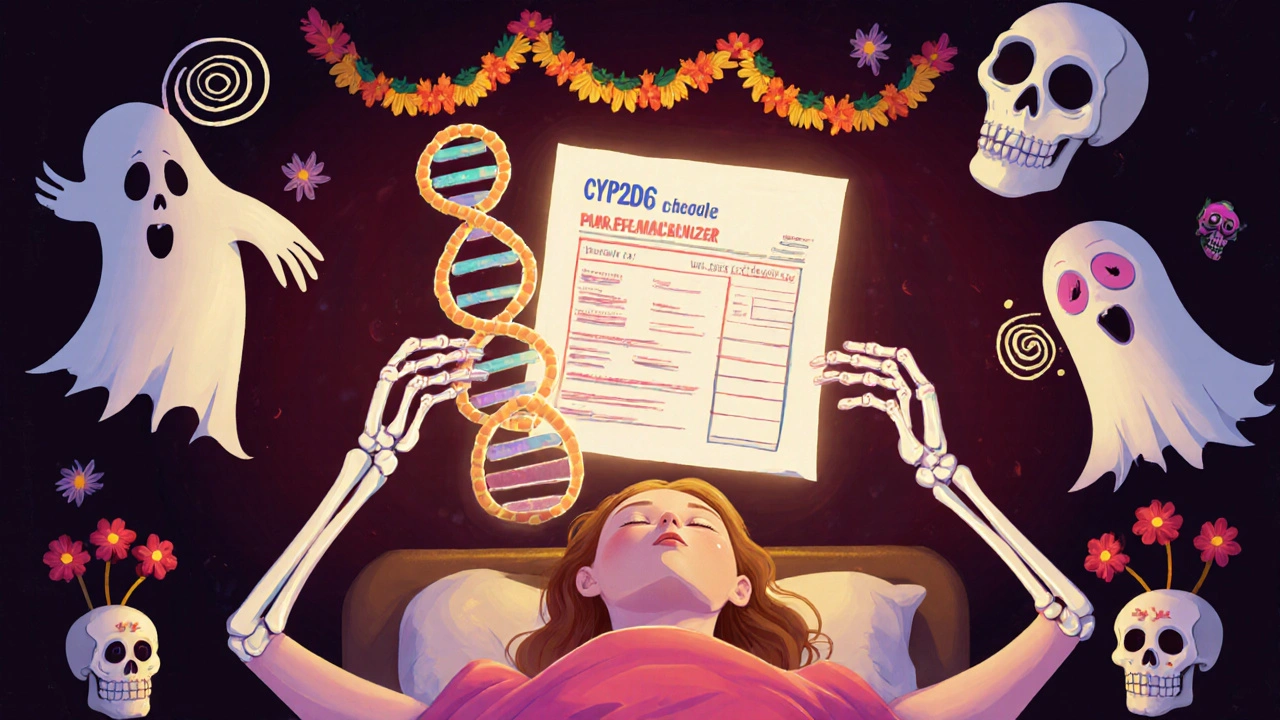
How Testing Works and What It Costs
Getting tested is simpler than you might think. You spit in a tube or get a cheek swab. The sample goes to a lab that looks for specific changes in CYP2C19 and CYP2D6. The test doesn’t scan your whole genome-it focuses only on the key variants that affect drug metabolism. Accuracy is high: 95% to 99%, depending on the lab.
Results usually come back in one to three weeks. But interpreting them isn’t simple. A report might say you’re a “CYP2D6 intermediate metabolizer.” What does that mean for your dose of fluoxetine? That’s where things get tricky. That’s why many clinics now work with pharmacogenetics-trained pharmacists. There are about 1,200 board-certified specialists in the U.S. who can help translate these results into real dosing advice.
Costs vary. In the U.S., the test can run $250 to $500. Insurance coverage is spotty. Only 62% of major insurers cover it for antidepressants as of mid-2024. Some clinics offer it as part of a broader mental health package. Others charge out-of-pocket. The good news? Studies show it can save money long-term. One analysis found pharmacogenomic testing could save $1,200 to $1,800 per patient by cutting down on trial-and-error prescribing, ER visits, and missed workdays.
Who Benefits Most?
This isn’t for everyone. But it’s a powerful tool for certain people:
- You’ve tried at least two SSRIs and had bad side effects
- You’ve tried SSRIs and they didn’t work at all, even at high doses
- You’re starting an SSRI and have a history of bad reactions to medications
- You’re taking multiple drugs that interact with CYP2D6 or CYP2C19 (like beta-blockers, antifungals, or some pain meds)
If you’ve been stuck in the “medication roulette” cycle-trying one drug, getting sick, quitting, trying another, getting sick again-this test can break that pattern. It doesn’t guarantee success, but it removes a lot of guesswork.
And if you’re starting treatment and have a family history of bad reactions to antidepressants? Testing might help you pick the right drug from the start.
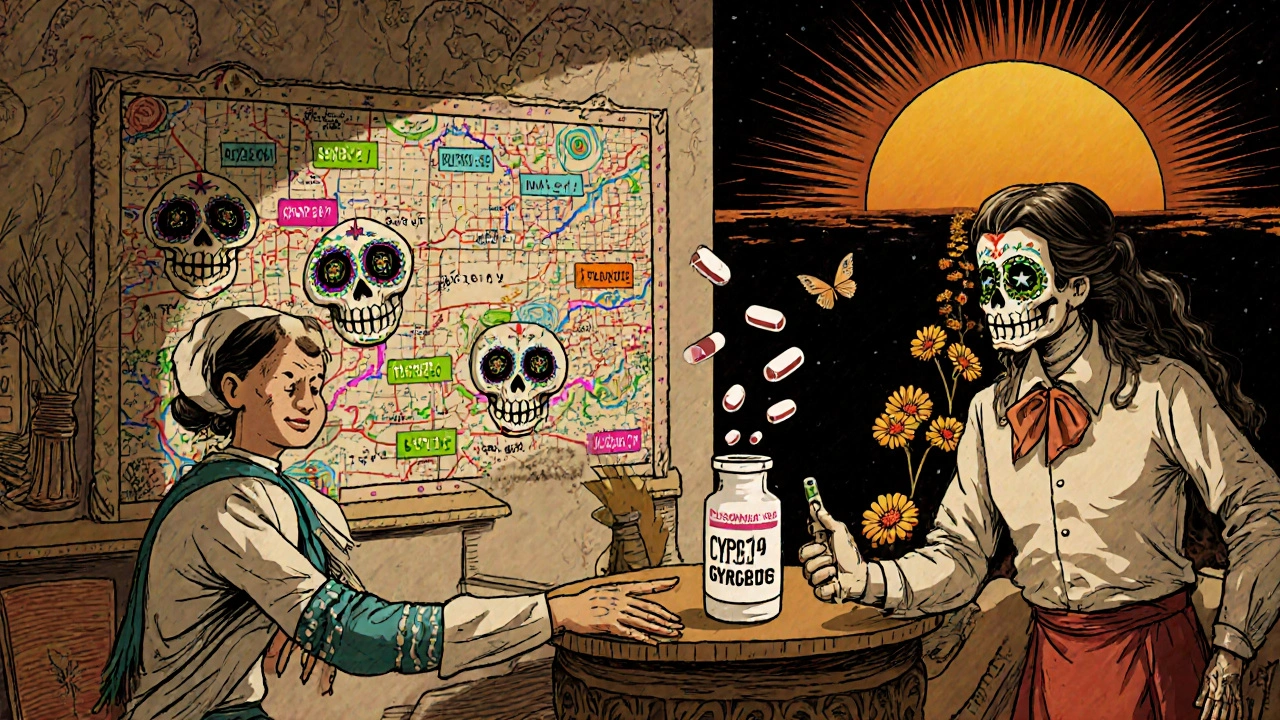
What’s Next?
The field is moving fast. In April 2023, CPIC updated its guidelines to include more genes: CYP2B6, SLC6A4, and HTR2A. These affect serotonin transport and receptor function-not just metabolism. That means future tests might give you a fuller picture: not just how fast your body clears the drug, but how sensitive your brain is to it.
The National Institutes of Mental Health just launched a $15.2 million study called GUIDED-2. It’s tracking 5,000 patients with treatment-resistant depression across 75 clinics. Results are expected by 2027. This could be the largest real-world proof yet that genetic testing improves outcomes.
Meanwhile, psychiatrists are catching on. A 2024 survey found 78% of them plan to use pharmacogenetic testing more in the next three years. The FDA now lists pharmacogenetic info for over 10 antidepressants on their labels. That’s a big shift-from research curiosity to clinical standard.
But it’s not magic. Don’t expect a gene test to replace your doctor’s judgment. It’s a tool. A smart one. But you still need to talk about your symptoms, your sleep, your stress levels, your other meds. Genetics gives you clarity. But recovery still takes time, support, and patience.
Bottom Line
If you’ve struggled with SSRI side effects, your genes might be why. CYP2C19 and CYP2D6 aren’t the whole answer-but they’re a critical piece. Testing won’t fix depression. But it can stop you from being poisoned by the very medicine meant to help you. For people who’ve been through the wringer of failed treatments and bad reactions, it’s not just science-it’s relief.
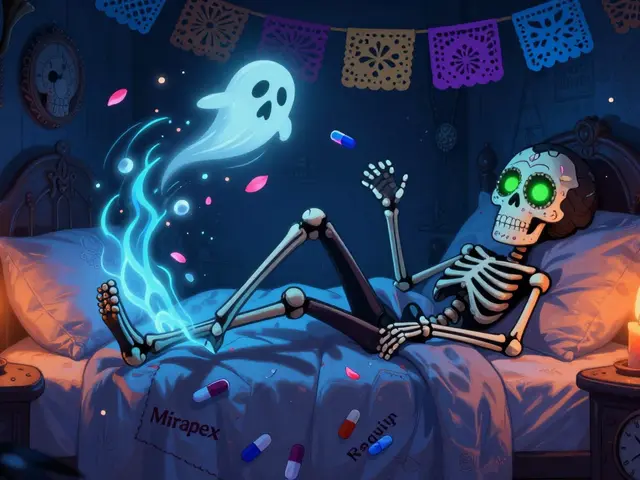
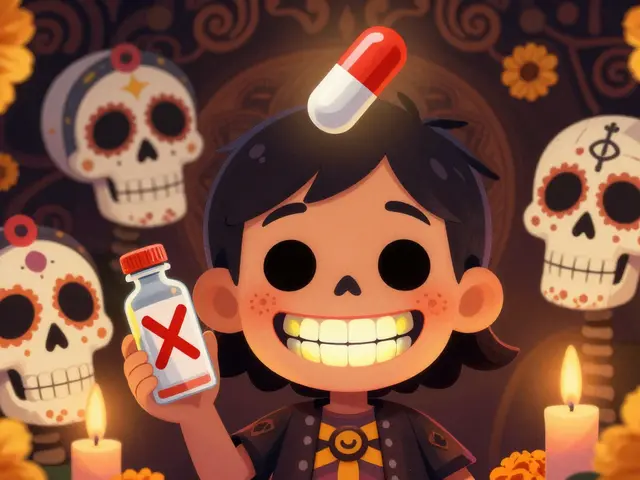
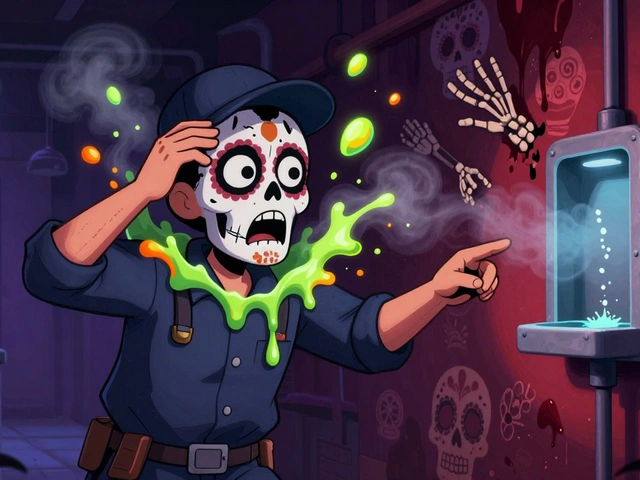


There are 11 Comments
ann smith
This is such a game-changer for people stuck in the medication roulette. I tried 5 SSRIs before finding one that didn't make me feel like a zombie. Knowing my genes could've saved me years of suffering. Thank you for sharing this.
Rahul Kanakarajan
Another gene hype train. Everyone thinks DNA is the answer but nobody talks about how most people just need therapy and sleep. This test costs $500 and tells you what your doctor should've figured out by listening.
New Yorkers
Let me tell you something about the human soul and its relationship with chemistry. We are not just enzymes and SNPs. We are cosmic beings caught in a biochemical prison, and this test? It's just another attempt to reduce the divine mystery of depression to a lab report. We are more than our liver.
David Cunningham
Been using this test in my practice for a year now. Saved at least 3 patients from quitting meds because they thought they were 'broken.' One guy was a CYP2C19 ultrarapid-20mg escitalopram did nothing. We doubled it based on his genes. He cried when he finally felt normal again. Not magic. Just science.
luke young
Love how this breaks down the science without overselling it. So many people think genetic testing is a crystal ball, but it's really just a compass. Helps you avoid the worst detours. Still need to do the work, but now you're not starting from zero.
james lucas
so like i got tested last year after 3 failed ssris and turns out im a cyp2d6 poor metabolizer?? my doc had no idea and kept upping my dose of paroxetine until i was basically hallucinating. once they dropped it to 10mg based on my genes? boom. no more brain zaps. i feel like a human again. also my insurance covered it because i had a hospital visit from the side effects lol
Jessica Correa
My mom tried fluoxetine for years and kept saying it didn't work. Then she got tested and was an ultrarapid metabolizer. They switched her to sertraline and she's been stable for 18 months. I wish we'd known sooner. This isn't sci-fi. It's basic pharmacology.
manish chaturvedi
In India, we rarely have access to such testing, but I’ve seen patients suffer needlessly because doctors assume everyone responds the same. This article reminds me why we must push for equitable access to precision medicine-even in resource-limited settings. Genetics doesn’t care about borders.
Nikhil Chaurasia
I appreciate this post. Truly. But I wonder… if we start relying too much on genes, will we forget to ask patients how they're really feeling? The lab report can't tell you if they're sleeping, if they're eating, if they still want to live. It’s a tool, not a replacement for care.
Holly Schumacher
Let’s be real: the FDA lists pharmacogenetic info for over 10 antidepressants, but the CPIC only gives SSRIs a B rating. That’s because the data is messy. You’re telling people to spend $500 for a test that doesn’t reliably predict efficacy? That’s not medicine-that’s profit-driven pseudoscience wrapped in a lab coat.
Julie Pulvino
I'm a CYP2C19 poor metabolizer. Took 10mg of escitalopram and felt like I was on a rollercoaster for two weeks. My doctor said, 'Just give it time.' But my genes said, 'Nope, too much.' We dropped to 5mg. Within days, the dizziness vanished. I'm not saying it's perfect-but it saved me from giving up on treatment entirely. Sometimes the body just needs a little less, not more.
Write a comment
Your email address will not be published. Required fields are marked *